I got started down this track working through my network trying to drum up business and find opportunity. I was talking with a client hiring for a Global Head of Compensation and asking if I could support them in their search. The reply was that in a candidate rich market like this and in a bid to reduce costs they would of course be hiring directly. The comment that really struck home was “I would be mad to use a search firm in this market, we have already had over 90 applicants and I am sure we will be fine”.
After putting the phone down, I pondered on the last comment about how “mad” someone would have to be to use a recruitment firm during an economic crisis. In short it infers that using a recruitment firm is an unnecessary luxury for the good times and not needed during the bad times. Naturally this didn’t sit that well with me, I feel that as a recruitment professional I add more value than simply placing candidates, but in reality I hadn’t really put together the reasoning and I hadn’t thought of anything solid on why direct hiring may not work?
To help write this article we felt it important to get a sense of candidate experiences with direct hiring process vs agency led processes. We conducted a survey of 2,342 HR Professionals within the UK to ask them for their experiences and opinions and as such have been able to wire in some important data.
Why do clients aim to hire more directly in a down market?
There are obviously a number of different reasons for this but in short clients will hire directly because:
- It reduces agency spend and overall costs.
- It can reduce time to hire.
- With more active job seekers on the market due to economic uncertainty – applications numbers tend to increase.
- It allows clients to utilise internal resource better and redeploy skills rather than make recruitment teams redundant.
- It allows clients to send a positive public message to market that they are still hiring and growing.
Is direct hiring always a cost save?
Hiring directly as a starting point of course reduces your agency spend, but the accepted view is that recruitment should never be seen as an opportunity to save money. If you need to hire talent, regardless of market conditions, your strategy surely must be about finding the very best person for your organisation. Equally whilst you may have secured an urgent hire directly the measurement for many firms is now about the success of the hire in post rather than the associated cost. It will inevitably cost you more in lost hours and productivity if the hire leaves within 3-6 months so whilst you may have saved in agency costs you may have lost revenue longer term.
Using our LinkedIn talent insights application we were able to track London HR market moves in the last 12 months. Looking at permanent HR Director and Head of HR Moves within M25 – 336 organisations hired professionals with these job titles in the last year. From the below we can draw some interesting conclusions.
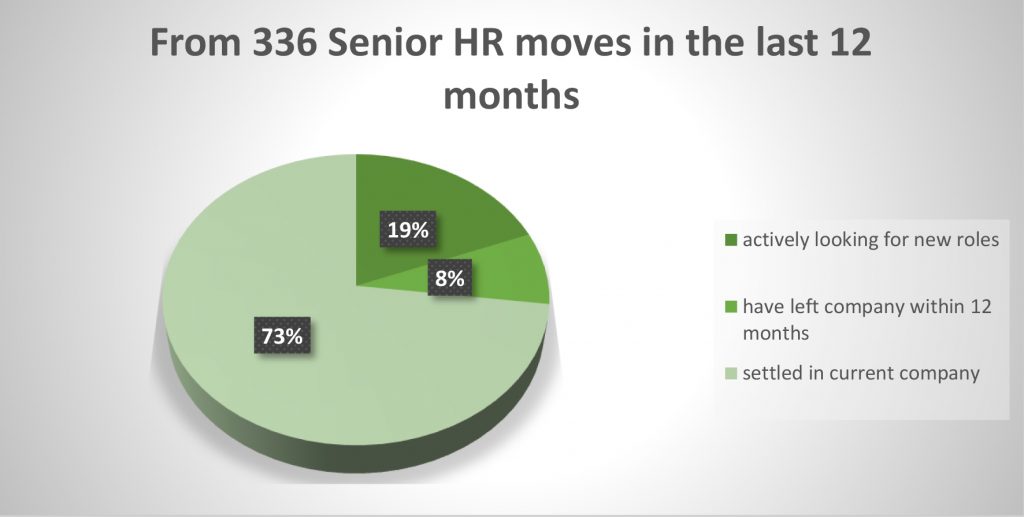
- 27% of the Senior HR Moves in the last 12 months have either not been successful or aren’t potentially going to work.
- 64 individuals are looking actively in the market, suggesting that an element of the hiring process or management of expectations hasn’t worked effectively.
- Whilst not all 336 hires were conducted by direct recruitment processes, the chart clearly indicates that it is a difficult position to fill successfully with 90 hires potentially not working out.
- With a 27% failure rate – surely hiring talent in niche industries has to be focused on finding the very best person for your role?
The point in all of this is that hiring directly may save money on agency spend but additional metrics needs to be considered to understand whether a cost save was really achieved. If you operated a direct sourcing approach only, but 27% of your hires left within 12 months you would need to assume that your hiring strategy is not delivering, and you aren’t saving money.
Do more active job seekers mean a better job response to direct adverts?
A majority of clients will use LinkedIn as their advertising channel. Whilst LinkedIn has a good reach; job adverts lack detail and with no salary guidance its is hard for many candidates to gauge the seniority of a brief. Additionally, its transparency around applicant numbers makes it easy for us to cross reference with clients the overall effectiveness of a direct campaigns, and it makes for some grim reading.
The first challenge is the sheer number of applications and how this can have a negative impact. Looking this morning on the 16th June I noted the following client branded adverts and their response rates:
HR Business Partner – London – Financial services – 492 applications over 2 weeks
Head of Talent Management – London – FTSE 100 firm – 371 applications over 3 weeks.
HR Business Partner- London – Investment Banking – 277 applications over 1 week,
HR Advisor – London – Well known tech firm – 897 applicants over 2 weeks
HR Manager – London – Media firm – 584 applicants in 4 days.
Looking at the above surely this would put off potential applicants, who would wonder how their CV would stand out from the crowd or indeed find its way to the potential hiring manager?
The second challenge clients have is how to manage and respond to the volume of applications they are receiving per role. To analyse this further see the below graph from our survey
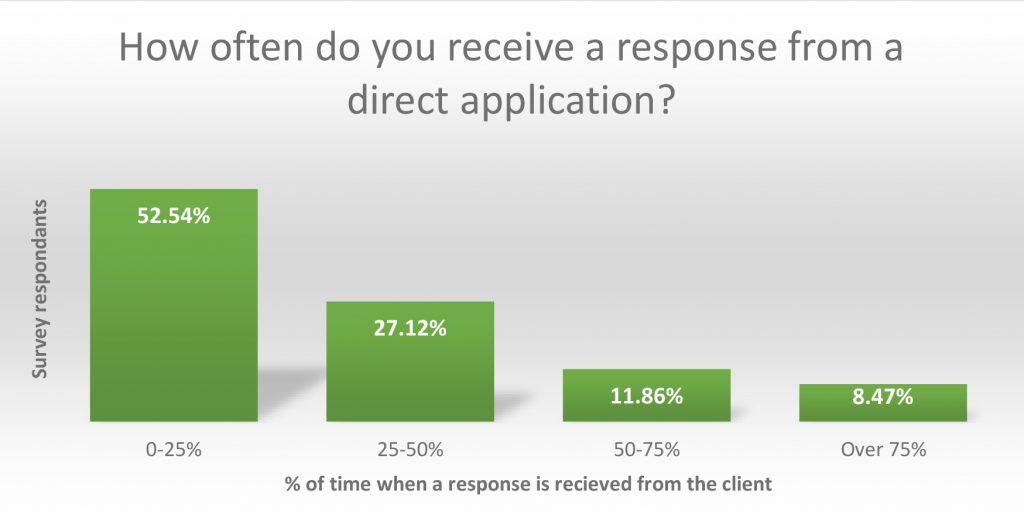
The data presents a challenging picture.
- Nearly 54% of the 2342 surveyed individuals only receive a response or acknowledgement on their job application 25% of the time or 1 out of every 4 jobs applied for.
Putting that into the job applicant numbers above for the HR Business Partner hire in London with 492 applicants that would effectively be 369 candidates who more than likely didn’t receive a response.
Looking through a leading FTSE 100 employer this morning as of the 16th June – we were able to note that they had advertised 76 live vacancies on LinkedIn for various departments. Tracking application numbers they had received in total 2467 applications for their respective vacancies. They haven’t currently outsourced their recruitment and two different contacts seem to be managing the vacancies. Assuming the above response rates you can expect that 1851 of the above applicants will never hear back from that client. How would this affect the perception of that brand by disgruntled applicants, and how do two recruiters manage and sift through 2467 different candidates effectively?
Applicant experience:
Reverting back to our survey we asked how applicants rated the recruitment experience when applying directly to client.
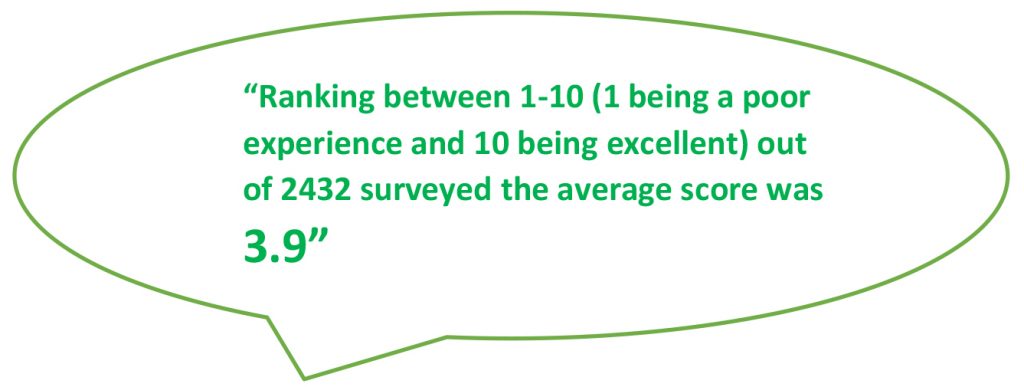
Delving further we asked people to rate which area of recruitment experience when applying directly were positive or negative. The results below drew some interesting conclusions:
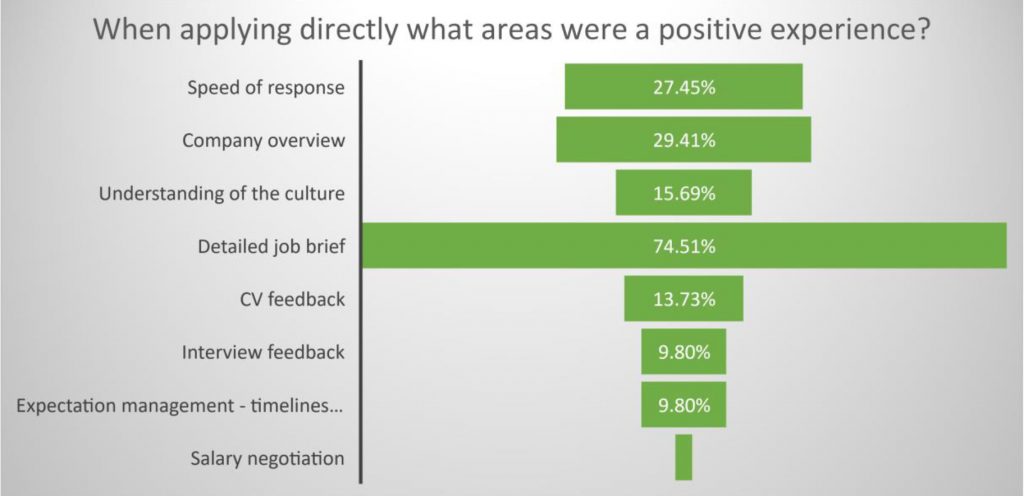
The above indicates the following:
- Interview feedback, understanding of culture, and expectation management are all areas where the experience of direct applicants is weaker.
- Understanding company culture, and managing expectations are crucial areas for candidates making future employment decisions – clients will lose good applicants because of this!
- Lack of CV and Interview Feedback will leave applicants frustrated and damage brand reputation.
- Company overview and detailed job descriptions are easy to administer effectively – It’s the softer skills of the recruitment lifecycle that are harder to manage.
The conclusions from the above draw further credibility when you assess the survey responses, when we asked how direct hiring processes can be improved.
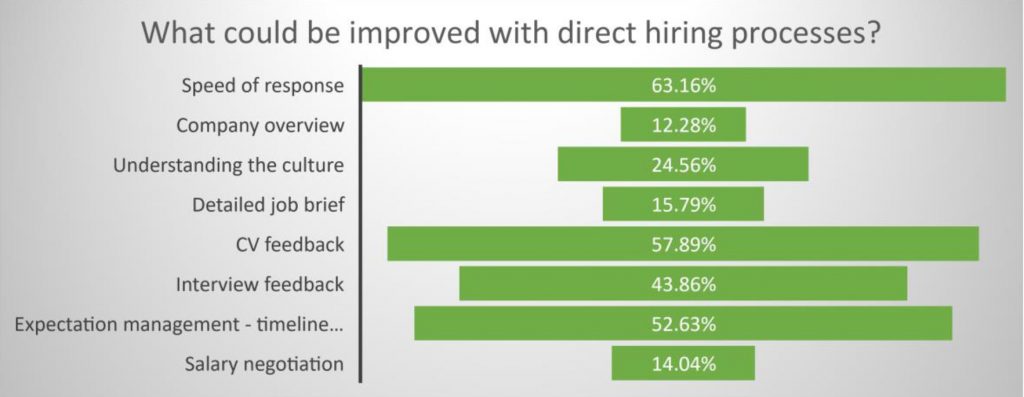
In short applicant numbers will increase in the current market, but the ability of firms to process and manage direct hiring campaigns sadly hasn’t really evolved in the last five years. The risks of missing out on the right candidate only increase when you are dealing with a much higher volume of information to wade through. So, whilst your chances of receiving strong applications has perhaps increased, the ability to find and secure the candidate hasn’t.
What is an effective solution to hiring during an economic crisis?
Many firms within the current economic landscape are being pushed to the limits regarding headcount and recruitment spend. Whilst we would advocate that direct hiring isn’t always the solutions to landing the best talent; within the current climate – we have to appreciate that needs must. So, with that in mind how can you increase your chances of landing the best talent, whilst still being cost conscious?
Through trial and error, we have seen several firms engage with us to work on roles in collaboration or to offer advice on targeting and assist with their own mapping.
Case study: Recruitment Partnering
“ Creatively, a leading FTSE 100 firm asked us to partner with them on hiring a Director of Compensation but admitted that the HR Budget was already under pressure and a normal recruitment fee would not be possible. Through their direct campaign they had received a high number of applications and had produced a very basic market map. What they didn’t have was the industry knowledge to put meat on the bones and help them focus on the best people. With 70 names of individuals who look great on paper with similar skills, they realised the need to engage with a supplier in the most effective way possible.
In this case we agreed a small token gesture in relation to a fee and worked with them to complete their market map and help them shortlist. They have recently offered their preferred candidate, who may have disappeared into the ether if we hadn’t been able to highlight their idiosyncrasies and give them insights that a LinkedIn profile simply can’t provide. So, the client effectively hired the best person and managed to engage a third party in a relatively creative manner to get the right result. “
Branded search firms will charge thousands for market maps, market insights, and referencing that businesses use to validate hiring decisions. Whilst contingent led mid-market firms may not have the sophistication of large research divisions, should clients consider how they can get the best out of recruitment businesses at a fraction of the cost to enable them to land the best talent?
Sourcing confirmation and support is an effective way to maintain your direct hiring focus whilst also being able to partner with your historical suppliers.
Conclusion:
Direct hiring in a down market is always going to be a key strategy for clients looking to take opportunity of increased candidate volumes and to manage internal costs. However, it comes with several notable challenges:
- The dangers of increased candidate activity doesn’t make life easier; in reality it can increase your chances of missing out on the right candidate.
- Poor candidate experience inevitably leads to negative brand perception from disgruntled applicants who don’t hear back.
- Short term cost is not the performance metric clients should be focusing on, more the success rate of a hire once they have joined
- Think creatively around third party usage and how you can manage your costs whilst still hiring the best talent.
Talented Reward professionals when taking on a new role often save a firm money on third party usage because no longer do the big four and other consultancies have same technical expertise monopoly that they once had. Reward professionals know how to get the best out of the consulting resources available rather than cutting a blank cheque, often asking for off the cuff info at no cost, or being creative and precise about what they can and will pay for.
Perhaps Talent Acquisition teams could look at recruitment firms in a more creative guise. The model of sending shortlists and placing candidates is slightly moribund in this market, and as such perhaps it’s time to think more outside the box on how recruitment firms can support you.




